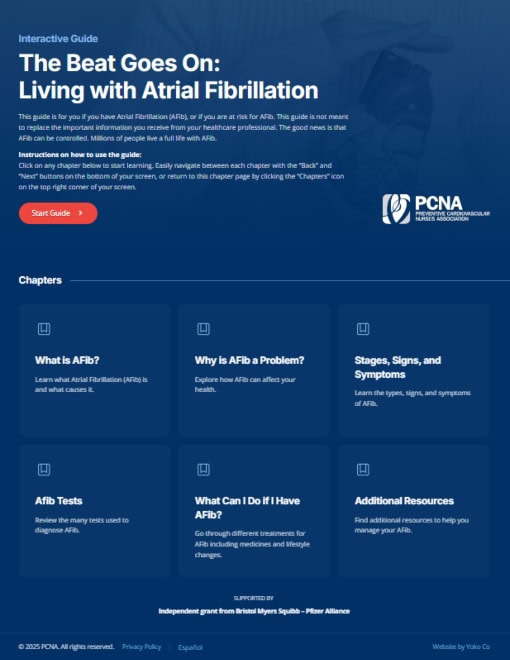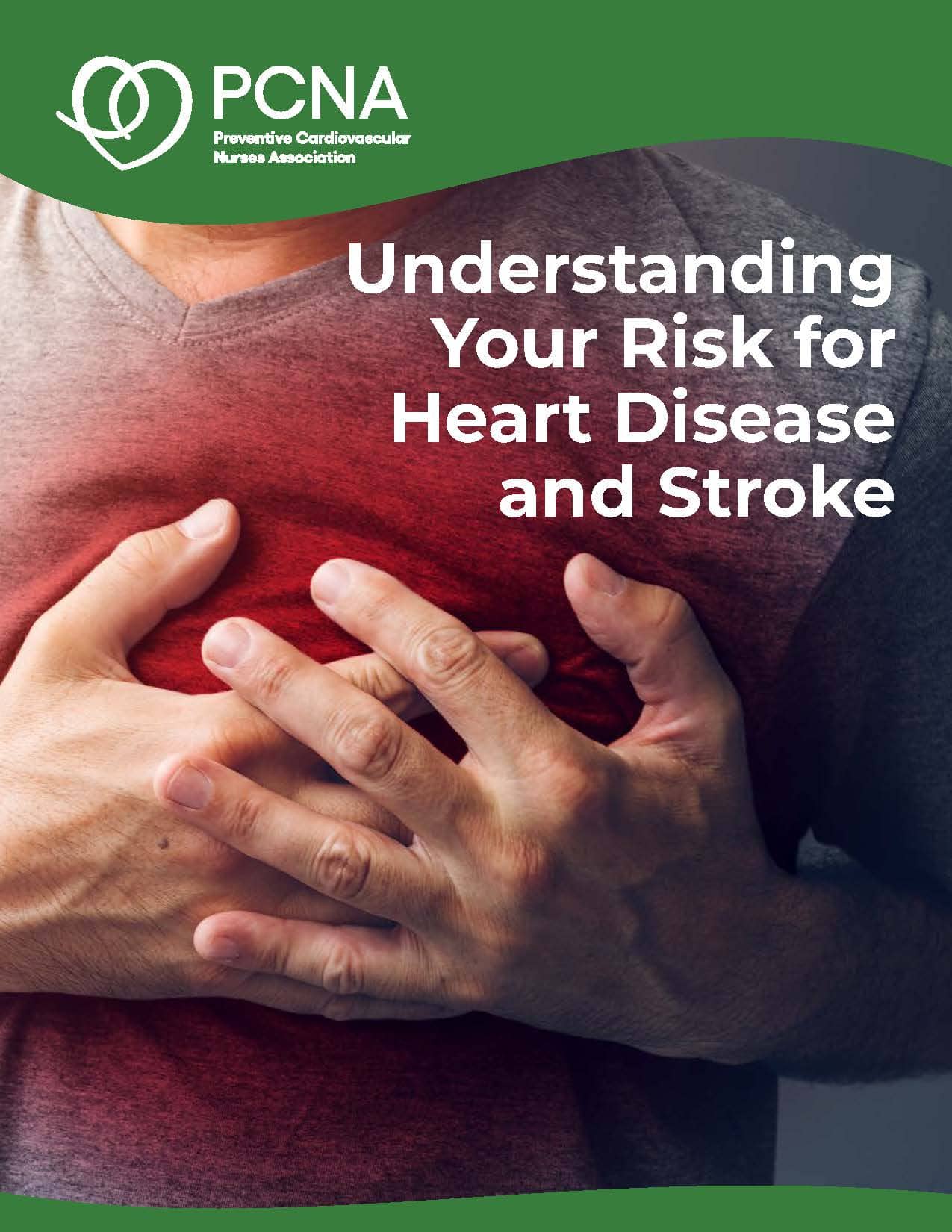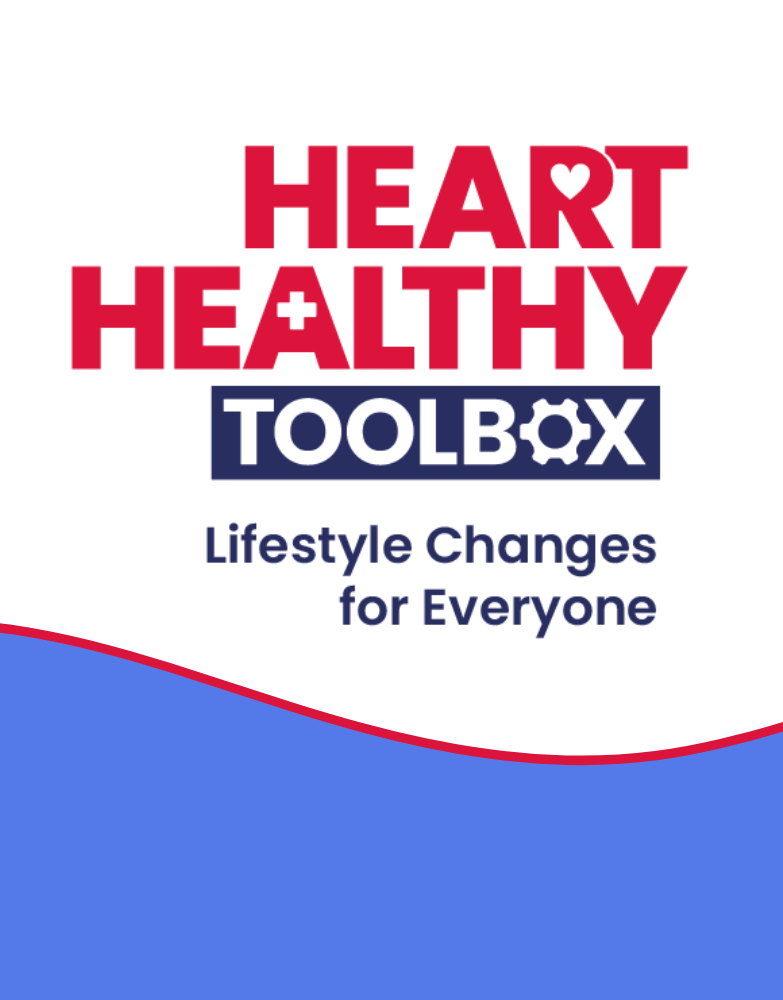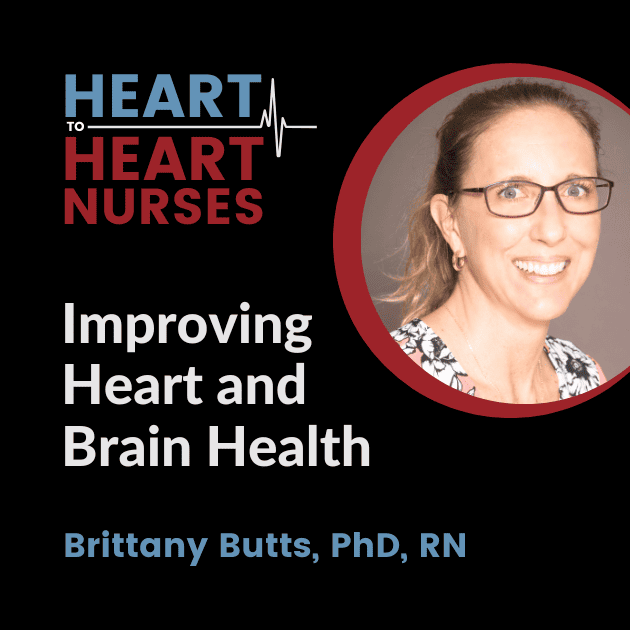What’s good for the heart is good for the brain. Guest Brittany Butts, PhD, RN, describes helping patients understand this connection and implement actions to decrease their risk for both cardiovascular and cognitive declines.
Episode Resources
- Mini-Mental State Examination (PDF)
- Montreal Cognative Assessment
- PCNA CE Course – Preventing Stroke: Applying the Guidelines
Welcome to Heart to Heart Nurses, brought to you by the Preventive Cardiovascular Nurses Association. PCNA’s mission is to promote nurses as leaders in cardiovascular disease prevention and management.
Geralyn Warfield (host): Welcome back to our audience, to our Heart to Heart Nurses podcast. Today we have the great pleasure of speaking with Brittany Butts. Brittany, could you please share a little bit about yourself with our audience?
Brittany Butts (guest): Sure, I’d love to. Thanks for having me. This is great. So, I’m an assistant professor at Emory University. My background is immunology, and nursing science focused on inflammation, cardiovascular disease, and brain health.
Geralyn Warfield (host): Well, let’s talk a little bit about that interconnection between cardiovascular disease and brain health. What, what would you like our audience to know about that?
Brittany Butts (guest): I would say big picture and easy to remember is that what’s good for your heart is good for your brain.
Geralyn Warfield (host): That is very simple. Oh my gosh, I love that. So [00:01:00] some things like healthy eating, getting enough exercise—all the things that we complain about sometimes.
Brittany Butts (guest): Yes.
Geralyn Warfield (host): So then how do you inspire, encourage and engage your patients in those healthy behaviors that will benefit both heart and brain?
Brittany Butts (guest): Yeah, that’s a good question.
So, if you think about people living with cardiovascular disease or at risk for cardiovascular disease, we tell them these things, right? You want to increase your physical activity or reduce your sedentary time. You want to try to promote a healthy diet. Do that gently. You don’t want to just be like, crash diet.
So, you want to—maybe each week or month or whatever works for them—change one thing. Reduce one thing. Or incorporate more fruits or vegetables. Moderate drinking. Quit smoking is a big one. Sometimes, central adiposity can be very inflammatory and can really be a risk factor. So, you may want to talk about different approaches to weight [00:02:00] loss that get paired with the lifestyle, if that’s appropriate; that may not be appropriate for everyone.
But these risk factors that you really think about and talk to about with your cardiovascular patients are also risk factors for cognitive changes, leading to cognitive impairment and dementia. And so it’s really the same conversation, just stressing that these can also affect your brain health.
Geralyn Warfield (host): So, I’ve seen recently some things that have come out in the literature that, beyond healthy eating, like the DASH diet or the Mediterranean diet, the things called the MIND diet and things that are similar. So even what we’re ingesting even now…as long as we have been alive, we perhaps have not been eating terribly healthy, [but] that we can make changes even now. Is that correct?
Brittany Butts (guest): You can. Yeah. So, really focusing on changing at any time can help.
One of the things we’re learning is that the processes leading to changes in the brain, leading to cognitive impairment, leading to dementia, leading to Alzheimer’s disease, often start during midlife. So, you [00:03:00] know, in your 40s, 50s, early 60s, when people tend to get cardiovascular disease like hypertension, atherosclerosis.
These vascular changes that occur with your cardiovascular disease also start the slow process that eventually leads to dementia.
Geralyn Warfield (host): So, those inflammatory markers that you might see for cardiovascular disease could start a conversation actually about what brain health would look like as well then.
Brittany Butts (guest): Oh, for sure. Because you don’t want to wait too late where you’ve already had these neurodegenerative processes that can’t be unwound. And so, the best thing you want to think about is prevention of onset, or delay of progression. And so that’s where these conversations with your patients, while you’re talking about their heart health, can also be the same conversation and brought together with brain health and help them think about that.
There are some things you might want to add, like puzzles and other specific cognitive protection things. But one of the most powerful ways you can help is reducing blood pressure. [00:04:00]
Geralyn Warfield (host): That’s an excellent consideration in terms of blood pressure, but because it’s very difficult sometimes for our patients, they don’t see the ramifications for that.
Brittany Butts (guest): Yes.
Geralyn Warfield (host): They don’t know that they have hypertension. So having that conversation and making sure that we’re taking those accurate blood pressure measurements in home or in office, or both, hopefully, that we can really, as a team, work on that together.
Brittany Butts (guest): Yeah, I agree. I think, and maybe if you can help patients better understand that we’re not just worried about what the numbers it is that we see on the Dinamap [monitor] when they come into clinic, or the spin thermometer, or however you do your blood pressure. But also, the effects that are happening that can affect the brain later in life.
And, sometimes that can help just really talking about the downstream effects that can happen, Not in a scary way, but just say, “You know, we’ve really found that keeping that blood pressure over this 120 is associated with cognitive decline in [00:05:00] Alzheimer’s. So we may want to think about, you know, really getting that blood pressure low even though it’s far in the future. We better start now.”
Geralyn Warfield (host): And I think sometimes people that are at midlife have a little bit more of an immediacy for making those changes. When you’re 20, perhaps it seems like it’s so far in the future that there’s, yes, we want to make behaviors that at that level or earlier that are preventing any disease from developing, but I think sometimes for those midlifers, as I might call them, there really is a rationale and they can see the immediate, potentially scary, but potentially health-altering things that they can do in, in life.
Brittany Butts (guest): I agree. And the ones that ask me about that often are the ones who are watching their parents, or have just watched their parents, have cognitive decline or dementia, and they want to know, is that going to happen to them?
And that’s where a great place for that conversation to start is, “Well, you know, here’s what we know and it can’t hurt to try these changes, to [00:06:00] get that blood pressure down, to manage that cholesterol, to manage that blood glucose.”
Geralyn Warfield (host): Great. We are going to take a quick break, and we will be right back.
Geralyn Warfield (host): We’re here with Brittany Butts talking about the connections between brain health and heart health. And I’m wondering if there are any specific strategies that you’ve seen be effective in clinical practice, maybe even a case study that comes to mind, or phrases that seem to really resonate with patients that you might be able to share with our audience.
Brittany Butts (guest): So that’s a great question. And so, I think that cardiovascular nurses and nurse practitioners can really play a great role in helping to manage potential cognitive changes in their population.
And so, some things that can be effective would be just to pay more attention to the patient as they come in and talk to their family members. Have they seen any changes? Ask some questions to see if they are having any problems following directions or long-term recall.
There’s also some brief cognitive assessments [00:07:00] that, if well planned, could be a great tool to not just assess cognitive function at that time that you’re thinking about, but track this patient’s cognition over time to see if it’s declining.
So, things like the Mini Mental State Exam. The MoCA (the Montreal Cognitive Assessment) is really good at mild cognitive impairment and really catching that early. And so, there’s different ways that I think we can try to follow their cognitive function.
Also, working with your team on medication management. And so, we may need to step back and talk to pharmacy and see are there any interactions that could be changing the cognitive functions that we’re finding. We still don’t know a lot about how some of these cardiovascular drugs affect brain health, so there’s a lot of work on there.
And so, I think helping them learn to manage their risk factors and then assessing what their cognitive function is over time would be something [00:08:00] I would love to see standard in clinical care.
Geralyn Warfield (host): Is there anything else that you would like to add that I’ve neglected to ask?
Brittany Butts (guest): Well, I would say, and I’ve said it, I would just like to highlight it, that really starting that conversation during this middle age time when people start to develop these cardiovascular comorbidities, such as coronary artery disease, hypertension, atherosclerosis, is a great time to start talking about long-term cognitive function.
Just like with palliative care. We’re really trying to start opening up palliative care as soon as someone gets diagnosed with heart failure, for example. I think we should do the same thing with brain health and just talk about how cardiovascular disease contributes to cognitive function and how they may want to start early in really thinking about prevention.
Geralyn Warfield (host): So, as our population is continuing to age and live longer, this is going to continue to be an issue that we need [00:09:00] to address in clinical practice.
Brittany Butts (guest): For sure. And with the number of people under age 65 living with cardiovascular disease increasing over time, it’s going to be an even bigger problem than I think we can guess in the future.
Geralyn Warfield (host): Brittany, thank you so very much for sharing your expertise with us today. It has been a pleasure to learn from your research and learn what our best practices might be for all of us in clinical practice, no matter what the population is that we are working with.
Brittany Butts (guest): Great. Thanks for having me.
Geralyn Warfield (host): Glad to have you. This is Geralyn Warfield, your host, and we will see you next time.
Thank you for listening to Heart to Heart Nurses. We invite you to visit pcna.net for clinical resources, continuing education, and much more.
Topics
- Atherosclerotic Cardiovascular Disease (ASCVD)
- Risk Assessment and Management
- Stroke
Published on
March 18, 2025
Listen on:

PhD, RN
Related Resources

Online Interactive Guides
The Beat Goes On: Living with Atrial Fibrillation Online Interactive Patient Guide
July 30, 2025


Patient Education Handouts
Understanding Your Risk for Heart Disease and Stroke Booklet
January 02, 2026







